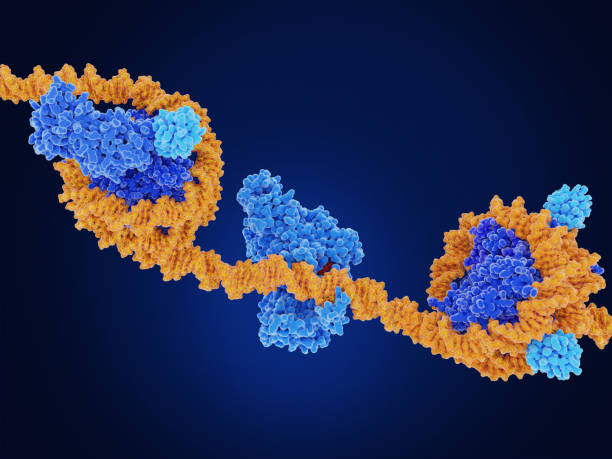Epigenetic Optimization: Unlocking Your Genetic Potential for Peak Health
Did you know that your lifestyle choices can influence how your genes express themselves? Welcome to the fascinating world of epigenetics, where science meets personalized wellness. Imagine being able to 'turn on' genes that promote health and 'turn off' those linked to disease risks. This isn't science fiction—it's the cutting-edge field of epigenetic optimization, and it's revolutionizing our approach to health and longevity.

The discovery of epigenetics has transformed our understanding of genetics. We now know that our genes are not our destiny—they’re more like a blueprint that can be modified. This revelation has opened up exciting possibilities for personalized health interventions that can potentially prevent diseases and optimize our wellbeing at a cellular level.
Epigenetic Mechanisms: The Tools of Gene Expression
To understand how we can influence our epigenome, it’s crucial to grasp the main mechanisms at play. DNA methylation, histone modification, and non-coding RNA are the primary epigenetic processes that regulate gene expression.
DNA methylation involves adding a methyl group to DNA, typically resulting in gene suppression. Histone modifications alter the structure of chromatin, affecting how tightly DNA is packaged and, consequently, gene accessibility. Non-coding RNAs, particularly microRNAs, play a role in post-transcriptional regulation of gene expression.
These mechanisms are dynamic and responsive to environmental cues, allowing our cells to adapt to changing conditions and potentially mitigate the effects of harmful genetic predispositions.
Lifestyle Factors that Shape Your Epigenome
The exciting aspect of epigenetics is that we have significant control over many factors that influence our epigenome. Diet, exercise, stress management, and sleep quality all play crucial roles in shaping our epigenetic landscape.
Nutrition, in particular, has a profound impact on epigenetic processes. Certain nutrients, known as methyl donors, are essential for DNA methylation. These include folate, vitamin B12, choline, and betaine, found in foods like leafy greens, eggs, and legumes. Polyphenols, abundant in fruits, vegetables, and tea, have also been shown to influence epigenetic mechanisms positively.
Physical activity is another powerful epigenetic modulator. Regular exercise has been found to induce favorable epigenetic changes, particularly in genes related to metabolism and inflammation. Even a single bout of exercise can trigger epigenetic modifications that enhance muscle adaptation and metabolic health.
The Promise of Epigenetic Therapies
The field of epigenetic medicine is rapidly evolving, offering new hope for treating and preventing various diseases. Researchers are developing epigenetic drugs that can selectively target and modify epigenetic markers associated with specific conditions.
Cancer treatment is at the forefront of epigenetic therapy research. Several epigenetic drugs have already been approved for treating certain types of leukemia and lymphoma. These medications work by reversing abnormal epigenetic changes that contribute to cancer development and progression.
Beyond cancer, epigenetic therapies show promise in treating neurodegenerative disorders, autoimmune diseases, and metabolic conditions. By targeting the epigenome, these therapies aim to restore normal gene expression patterns and cellular function.
Practical Applications: Optimizing Your Epigenome
While epigenetic therapies are still in development, there are numerous ways to optimize your epigenome through lifestyle choices:
- Embrace a nutrient-dense diet rich in methyl donors and antioxidants
- Engage in regular physical activity, combining aerobic exercise and strength training
- Practice stress-reduction techniques like meditation or yoga
- Prioritize quality sleep and maintain a consistent sleep schedule
- Minimize exposure to environmental toxins and pollutants
- Cultivate positive social relationships and emotional well-being
Epigenetic Wellness Tips
- Cruciferous vegetables like broccoli and cauliflower contain sulforaphane, a compound that activates tumor suppressor genes
- Regular consumption of green tea may promote DNA methylation of oncogenes, potentially reducing cancer risk
- Intermittent exposure to mild stress, such as through cold showers or sauna sessions, can trigger beneficial epigenetic changes
- Mindfulness meditation has been shown to influence epigenetic markers related to stress response and inflammation
- Exposure to nature and sunlight can positively impact your epigenome, promoting overall wellness
As we continue to unravel the complexities of epigenetics, one thing is clear: we have more control over our genetic expression than we ever imagined. By making informed lifestyle choices and staying abreast of epigenetic research, we can actively participate in optimizing our health at the most fundamental level. The future of personalized medicine lies in understanding and harnessing the power of our epigenome, paving the way for a new era of proactive, precision healthcare.




